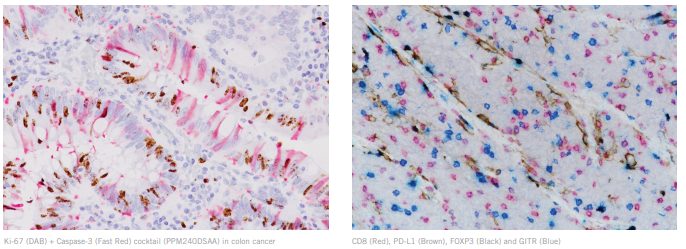Maximize Your Research Through Multiplexing Technology
Maximize Your Research Through Multiplexing
Researchers understanding of molecular biomarkers that define normal and disease states is constantly evolving. To accurately characterize cell
population, novel assays, technologies, and imaging platforms are required.
Multiplex immunohistochemistry (IHC) is one avenue increasing the capabilities of clinical research, providing researchers with tools to
investigate complex and heterogeneous tissues in a powerful manner. Unlike next generation sequencing and mass spectrometry, multiplex IHC
allows for the examination of spatial arrangement of target proteins and well as protein interaction/co-localization. Multiplexing allows for many
advantages including:
• Simplified procedures, Reduced turn-around time
• Reduced costs and labor by >50%
• Preserve precious tissue specimens
• High number of protein markers tagged to sample1
• High data output allowing for multiple markers on a single slide1
• Reduced error compared to multiple single stain assays.1
Biocare Medical is the proven leader in providing antibody cocktails and detection platforms that enable sequential and simultaneous IHC
staining. These products allow morphological distinction of the antigens on a single slide, preventing redundant staining, especially in cases
where tissue may be limited. Biocare offers biotin free micro-polymers for the simultaneous detection of both HRP and AP enzymes in a single
solution and provide superior, sensitive staining in both human and animal tissue. For sequential multiplexing, Biocare offers polymers adsorbed
against numerous species and Denaturing Solution (elution step) to eliminate cross-reactivity between protocols. All Biocare’s multiplex products
can be used manually and on IHC instrumentation, both automated and semi-automated.
Advanced Multiplex Staining
To support your research needs, Biocare Medical offers primary antibody cocktails for nearly all disease states, secondary antibodies against a broad range of species (human and animal), and multiple chromogen colors to allow distinct visualization. Contact Biocare at 800-799-9499 or www.biocare.net to see how multiplexing can maximize your research.
1. Dixon, Angela, et al. “Recent developments in multiplexing techniques for immunohistochemistry”. National Center for Biotechnology Information. 6 August 2015, https://www.ncbi.nlm.nih.gov/pmc/articles/PMC4810438/


